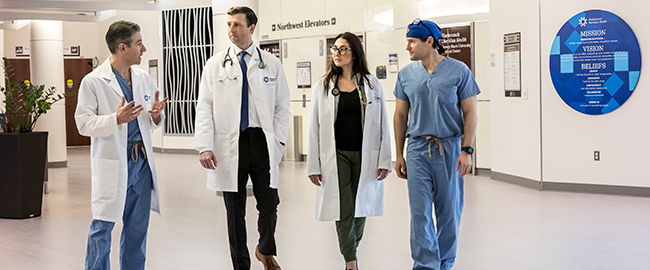Electrophysiology in New Jersey
What is an Electrophysiology Study (EPS)?
An electrophysiology study is a minimally invasive test that studies the electrical signals of the heart to find what is causing the heart to beat too fast, too slow or irregularly and to determine the best way to treat it. An EPS uses 3-D mapping technology and catheter-based approaches to evaluate arrhythmia (abnormal heart rhythms) and introduce different medicines to see which one can bring your heart rate back to normal.What to Expect
During an electrophysiology study, electrophysiologists use advanced, image-guided technology to insert a catheter — a thin, hollow tube — through a puncture in the wrist or upper leg and into the heart.Catheter-based techniques are relatively painless. The area of the puncture is numbed, and patients receive medicine to relax.
Additional Procedures
After the electrophysiological study determines the cause of the abnormal heartbeat, a minimally invasive procedure or surgery may be needed to treat it, including:
- Catheter Ablation: This minimally invasive procedure uses a catheter to apply heat or cold (cryoablation) to disrupt or destroy heart tissue that causes an arrhythmia. It requires a short hospital stay and offers a quick recovery.
- Implanted Electronic Cardiac Devices: Small battery-powered devices, such as pacemakers, defibrillators and cardiac resynchronization therapy (CRT) devices, are connected to one or more wires (called leads) and are surgically placed under the skin near the collarbone. These devices automatically deliver an electrical signal to control your heartbeat.
- Lead Extraction: This is a surgical procedure where the leads from implanted cardiac devices are removed. This is typically needed due to infection or damage of the leads.
- WATCHMAN™ Left Atrial Appendage Closure: This advanced surgery can significantly reduce the risk of stroke in people with atrial fibrillation by blocking the area in the heart where most stroke-causing blood clots form, called the left atrial appendage.
Convenient Access to Expert Heart Care
Hackensack Meridian Health offers patients access to innovative surgical procedures at these two major academic medical centers, as well as highly coordinated treatment and cardiac rehabilitation services through our integrated network of hospitals located close to home.
Frequently Asked Questions
Why would my doctor recommend an electrophysiology study (EPS)?
An EPS is recommended to study your heart's electrical signals and find the specific cause of an abnormal heart rhythm (arrhythmia), such as a heart that beats too fast, too slow, or irregularly. It helps determine the most effective treatment for your condition.
Is an electrophysiology study painful?
The procedure is considered minimally invasive and relatively painless. The area where the thin catheter is inserted (usually the wrist or upper leg) is numbed, and you will receive medicine to help you relax during the test.
What happens if the study finds the cause of my abnormal heartbeat?
After the study identifies the problem, your doctor may recommend a procedure to treat it. Common treatments include catheter ablation (using heat or cold to treat the problematic heart tissue) or the surgical implantation of a cardiac device like a pacemaker or defibrillator to control your heartbeat.









